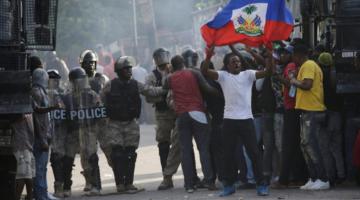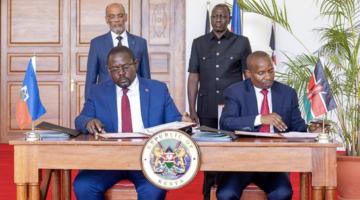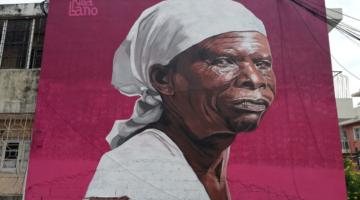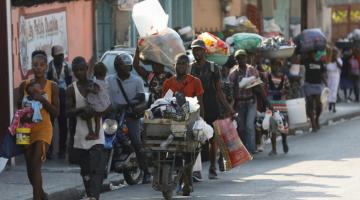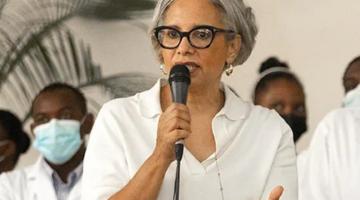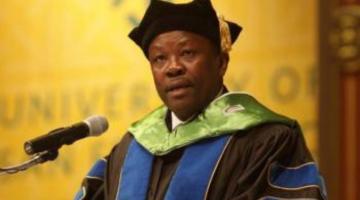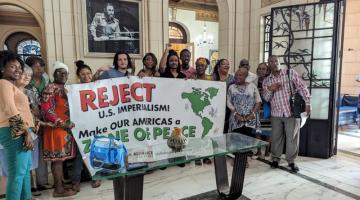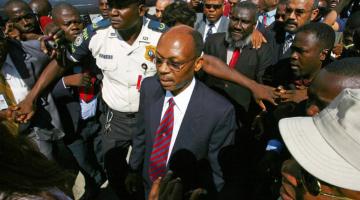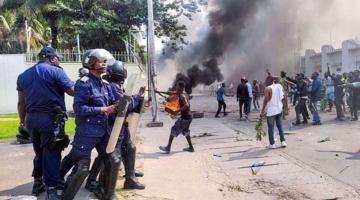“When the police finally left the campus, around 11 a.m., nine civilians lay dead in the courtyard — five of whom had been shot in the head.”
At 5 o'clock on the morning of November 13, more than 200 Haitian police officers raided the Grand Ravine area of Port-au-Prince. There was a series of loud explosions, followed by gunfire. For the next six hours, the commotion didn’t stop. The neighborhood was under siege.
What had started as an anti-gang operation in a poor and largely forgotten neighborhood — in a poor and largely forgotten country — ended in the summary execution of innocent civilians on a school campus.
The police officers were working with the United Nations Mission for Justice Support in Haiti. It was launched in October, a reboot of a previous mission that had begun in 2004, when thousands of U.N. troops were sent to Haiti following a coup d’etat, tasked in part with restoring stability and reinforcing national police capacities.
And though the U.N. mission issued a statement days after the raid calling for a prompt investigation by Haitian authorities, it did not publicly acknowledge its own role in the operation. But in late December, a U.N. spokesperson confirmed to The Intercept for the first time that the mission had helped plan the raid, though it distanced itself from the civilian deaths.
“The reported civilian death[s] were not part of the planned operation but of a unilateral action conducted by some [Haitian police] officers after the conclusion of the operation,” the spokesperson, Sophie Boutaud de la Combe, wrote in an email. The raid of the school, according to the U.N. statement, was done without authorization, without alerting the police hierarchy, and outside of the operational plan.
“The U.N. mission did not publicly acknowledge its own role in the operation.”
Boutaud de la Combe said that, a day after the raid, the U.N. “conducted an internal enquiry with all the unit commanders who participated in the operation.” The U.N. inquiry, not previously reported, absolved the U.N. finding that U.N. police did not fire their weapons and only “secured the perimeter” of the school, she said.
“None of the [U.N. police] unit proceeded to the location at Maranatha College where the alleged killings took place,” the spokesperson wrote. “The planned portion of the operation went relatively well. The post-operation unilateral initiative of some HNP members to conduct a high risk search, proceeding outside of the operational cadre, without advising the hierarchy, without authorization and contravening the operation plan was not part of the planned operation.”
When I arrived at the Maranatha Evangelical College campus, traveling with a broadcast team from Al Jazeera four days after the raid, it was immediately obvious something heinous had transpired.
The blood that stained the concrete was still wet, unable to dry in the blanket of fog and mist that kept the capital unusually cool that particular week. Water pooled in the courtyard’s clogged drain had turned a dark red, partially obscuring an empty tear gas canister. The smell of the violence still hung in the heavy air.
Classrooms and offices had been ransacked, the contents of closets, drawers, and bookcases spilled across the floors and through the doorways. Light crept in through holes left by bullets that had pierced through the thick concrete. Sometime since the raid, someone had swept another five empty tear gas canisters and close to 100 heavy artillery shells into a pile.
“Water pooled in the courtyard’s clogged drain had turned a dark red.”
The morning we arrived, faculty and students were meeting to mourn those who had been killed. The school was still closed. They gathered in one of the small classrooms, closed the door to us outsiders, and began to sing. The religious hymns — deep, soulful melodies — echoed throughout the courtyard where they mixed with cries of grieving victims and family members anxious to tell their stories.
“I must kill myself,” Monique Larosse, whose nephew was shot in this courtyard days earlier, told us. “Why did they kill him when they know he was not one of the bad men? He was someone who went to church, studied, and had principles.”
The stories Larose, along with other survivors and family members, told me make clear something went horribly wrong on that mid-November day. While there’s a lot still unclear, one thing is for certain — the official narrative is at odds with what the people of Grand Ravine say they witnessed and experienced. And they are a far ways off from finding justice.
Located near the southern entrance to Haiti’s sprawling capital, Grand Ravine is built on a hillside with picturesque views of the Caribbean Sea. And yet, it’s a downtrodden neighborhood.
Haphazard construction with paltry regulation has left neighborhoods, including Grand Ravine, with little to no infrastructure or government services. Many areas are only accessible by foot.
Narrow, misshapen alleys ascend through the concrete homes secured with rusted sheet metal.
Amid all this is the Maranatha Evangelical College, which has operated here since the 1940s. Despite the name, it offers classes for neighborhood kids beginning in preschool. The campus is a mashup of school buildings, houses and a healthy number of full-size trees, a dissonant image in a city overwhelmed by concrete. A low wall marks it off from the surrounding area.
The only entrance to the elevated campus is a sloping, winding road that sits behind a large metal gate. The campus is a refuge, an oasis of calm in a section of Haiti rife with gang activity.
Grand Ravine is a “red zone,” the label international forces give to the country’s most violence-prone areas. In December 2016, Grand Ravine’s most powerful gang leader, Junior Decimus, was arrested at the airport when he attempted to travel abroad. Soon after, according to a report by local rights organization Justice and Peace, an armed conflict began as others sought to consolidate control of the neighborhood. “Bursts of automatic weapons sang during the day, while police officers from the nearby station watched helplessly,” according to a hard copy of the organization’s report.
In October, the month before the police raid, groups of armed youth set up roadblocks, robbing cars in plain sight as they passed.
“The official narrative is at odds with what the people of Grand Ravine say they witnessed and experienced.”
The same month, thousands of U.N. soldiers stationed in the country since the 2004 coup d’etat withdrew. Brought to Haiti to restore “stability,” the foreign troops have been involved in multiple deadly raids into neighborhoods similar to Grand Ravine. The international community has spent hundreds of millions training the Haitian police for the U.N.’s eventual departure.
The U.N. Stabilization Mission in Haiti ended its mandate in October, but the U.N. is by no means gone. In place of troops, the U.N. created a smaller successor mission composed of a few thousand police officers. In early November, together with the local police force responsible for the capital, that new U.N. mission helped plan the anti-gang raid into Grand Ravine.
The November 13 raid was one of the first major acts involving the new mission, and the response will define the future of the U.N.’s relationship with the people of Grand Ravine — and the success of the newly empowered local police force.
At 6:30 on that mid-November morning, Armand Louis received a phone call from Maranatha College, the school he has directed for the last 30 years. Something was wrong. The police raid had spilled onto the school’s campus.
When he arrived nearly two hours later, tear gas was already being employed by police, according to an investigation by the National Network of Human Rights Defenders, a local human rights organization known by its French acronym, RNDDH, and confirmed in an interview with Louis. The following account is based on Intercept interviews with multiple witnesses, whose recollections mirror those included in RNDDH’s subsequent report on the massacre.
Police opened and searched classrooms, ransacking them in an apparent attempt to locate gang members hiding on campus. They didn’t find any.
There was a brief period of calm. People still on campus gave water to police. The burning in their eyes from the tear gas subsided.
An hour later, Louis said, the school’s guard, Julio Fongene, approached him and said that a number of gang members had threatened him and were hiding in a storage facility on campus. Louis informed the police.
“The campus is a refuge, an oasis of calm in a section of Haiti rife with gang activity.”
When officers attempted to dislodge the hiding gang members, two police officers were shot. The gang members fled. It does not appear that any were apprehended, as the police have not made public any arrests of those responsible for shooting the officers.
U.N. units composed of police from Jordan and Senegal responded to reports of shots fired and arrived at the school. According to the U.N., they administered first aid to the injured police officers and secured the perimeter.
But on campus grounds, Haitian police proceeded to punish the bystanders caught up in the violence.
First, they shot and killed Fongene, the guard, witnesses said.
Police then accused Louis of setting them up. They dragged him into the central courtyard, where some faculty members and people who live on campus were present. The officers beat him with a chair, causing significant injuries to his head and torso. The Protestant Evangelical Baptist Mission of Haiti, affiliated with the school, included an account of the beating in its statement describing the events, and it was confirmed in an interview with Louis and in the RNDDH report.
Faculty tried to intervene. David Jean Baptiste, a professor, was beaten and then shot five times, including a bullet to the head. The courtyard grounds where he died remained bloodstained for days after.
Vanel Danger lives on the school’s campus and is responsible for the cafeteria. He told The Intercept that an officer put a gun to his head and threatened to pull out his teeth if he didn’t cooperate. Danger dropped to his knees and begged for his life. Danger told the officer he had given him water just an hour earlier, RNDDH reported. Danger was spared. But many more weren’t so lucky.
Louis, bloody and beaten, told The Intercept he was handcuffed by an officer in a U.N. uniform and hauled off to jail.
When the police finally left the campus, around 11 a.m., nine civilians lay dead in the courtyard — five of whom had been shot in the head. Not a single firearm was recovered, suggesting that the killings were “summary executions,” RNDDH reported.
The bodies were not removed until the next afternoon.
Four days after the raid, the alleys that weave around the campus and through the neighborhood’s hilly landscape were largely deserted. Groups of young kids watched us from rooftops. Darting eyes peering from behind small openings in concrete homes followed us throughout the neighborhood.
Very few of them wanted to speak.
“There are many more” victims of this and other shootings, a local resident and student at the school explained. “They are afraid,” added the student, whose name The Intercept is withholding out of concern for their safety.
Though the anti-gang raid ended with a schoolyard massacre, questions linger about what happened outside the campus, where the raid began. At first, the police acknowledged seven civilian deaths — all of which occurred at the school. Overall, the police made 32 arrests, but haven’t acknowledged any deaths outside of the school.
But in its investigation, RNDDH concluded that one of the people found dead on campus had been pulled out of his house in the surrounding neighborhood that morning and brought to the school only after his death.
The total death toll remains unknown.
“Haitian police punished the bystanders caught up in the violence.”
Doresne Jean, director of the Saint Claire morgue in downtown Port-au-Prince, said that eight bodies had arrived from Grand Ravine on Tuesday, the day after the raid — more than the police originally acknowledged. But Jean said there were surely more.
“Maybe the police moved some bodies,” Jean said, “because we had five or six people come here to ask if we had their relatives.” They were not on the list of bodies already received.
Justice and Peace, the local human rights organization that has been monitoring violence in neighborhoods such as Grand Ravine, was one of the first to investigate the massacre. Rovelsond Apollon, an observer there, said his organization had confirmed 12 dead, but that the real total would likely never be known.
Not that many people, even in Haiti, are paying attention to what happens in Grand Ravine. “A hundred or even 200 could die there and nobody would know,” Apollon said.
I don't know how I am going to live without my son,” Gina Napolean told us from the school’s courtyard, the grief visible on her face just four days after the massacre. Her only son, 22-year-old Kens Napoleon, had been the family’s breadwinner. He was killed by a shot to the head. She put the blame squarely on the government, who she accused of “sending the police to kill our children.”
It’s not just that politicians exert control over the police, Apollon said — they are involved with the gangs themselves. His organization has interviewed young people with heavy weaponry that is not easy to acquire, he explained, and they said the weapons had been provided by politicians. “Politicians and authorities are not innocent in what happened, because they, too, play their part in the violence,” he said. The politicians, for their part, have not publicly addressed these accusations.
But since the raid, nearly every government official or institution has avoided taking responsibility.
Asked about the raid, the police chief simply said it was planned by the local captain and the new U.N. mission. Prime Minister Jack Guy Lafontant told the press that the specifics of field operations were outside his purview. Both blamed poor planning for the bloodshed.
The operation was compromised from the beginning. Police officers told local human rights investigators that confidential information about the operation was circulating even before it took place.
A former Haitian military official later told me that he found out about the raid when he heard it being discussed on an open radio channel on November 12, the day before it was launched. A gang leader later called in to a local radio show, alleging that a rival gang from a different neighborhood had participated with police in the raid itself. Others have suggested the raid was an attempt to recover a cache of guns that authorities had distributed in the neighborhood weeks earlier. And so the rumor mill in Haiti churns.
The U.N.’s statement — that its officers were stationed only at the perimeter of the school — contradicts the statements made by Louis, who told me he was handcuffed by a U.N. agent on campus. The U.N. insists that it was uninvolved because its officers were not in the courtyard, but the entrance where they say they were stationed is set just below the scene of the massacre.
The new U.N. mission is ostensibly focused on justice, but Apollon noted that Haiti has seen many international missions throughout its history. “They all failed,” he said, because they do not understand the Haitian reality.
In Haiti, he said, impunity reigns.
“David Jean Baptiste, a professor, was beaten and then shot five times, including a bullet to the head.”
Nearly two months after the massacre, no one has been publicly held responsible. The police inspector general has completed an investigation and passed it on to a judge, who could order the arrest or dismissal of officers involved. One police officer accused of involvement is already missing, according to the inspector general. Families of nine victims, including those of the two police officers, received a one-time payment of about $1,500 for funeral expenses. But none of the intellectual authors of the botched raid appear to have been identified or questioned.
Instead, it was Louis, the school’s director, who was arrested for complicity in the death of the two police officers. After being publicly beaten with a chair at the school he had overseen for 30 years, Louis was held in a Port-au-Prince jail for more than a week.
Under pressure from religious organizations and the school’s faculty, Louis was eventually released for health reasons. But he still has not returned to the school.
“In a country like mine,” Louis wrote to me weeks later, “it is hard to take our leaders at their word.” That, he continued, was “why we need to know what the real motive [of the raid] was.” The public authorities have not yet interviewed him. Do “they really want everything to be investigated properly?” he said, “or was this all planned?”
Apollon said continued raids would do little to address the fundamental problems afflicting neighborhoods such as Grand Ravine. Rather, violence stems from the total absence of the state in such areas, and it will continue so long as the population’s needs are not met. What residents need, he said, “is education.”
After the raid, the school was closed for two weeks.
“We need school,” a student at Maranatha told me that day in the courtyard. “Without education, what hope do we have?”
This article previously appeared in The Intercept.


